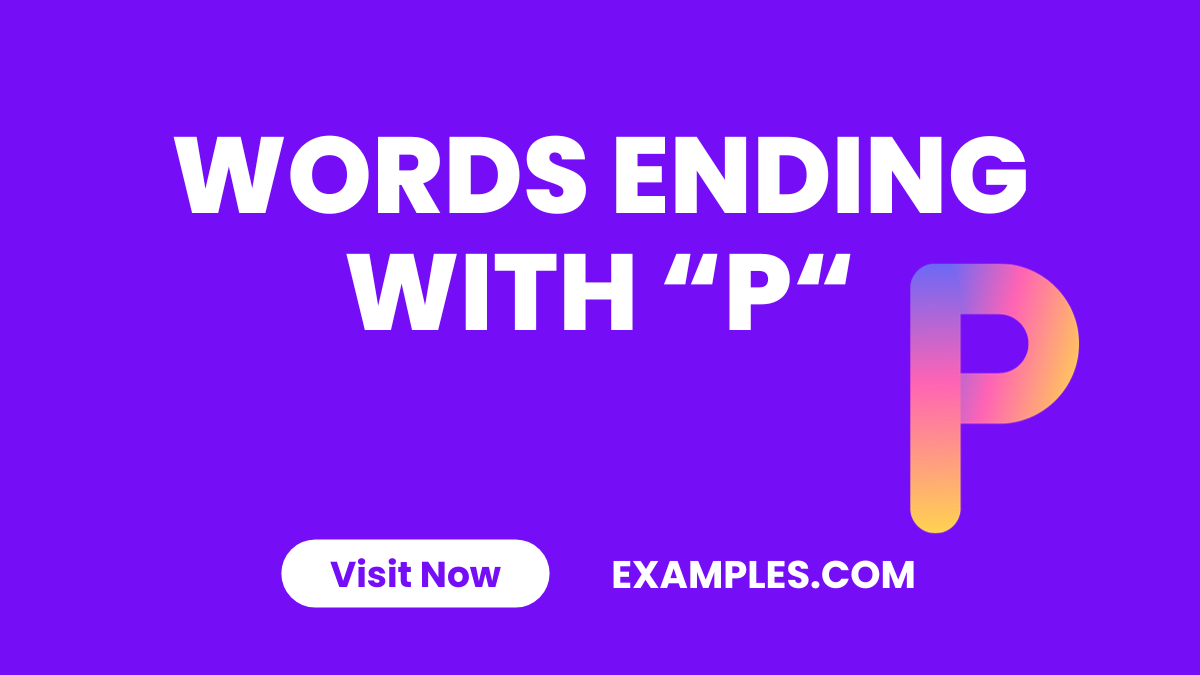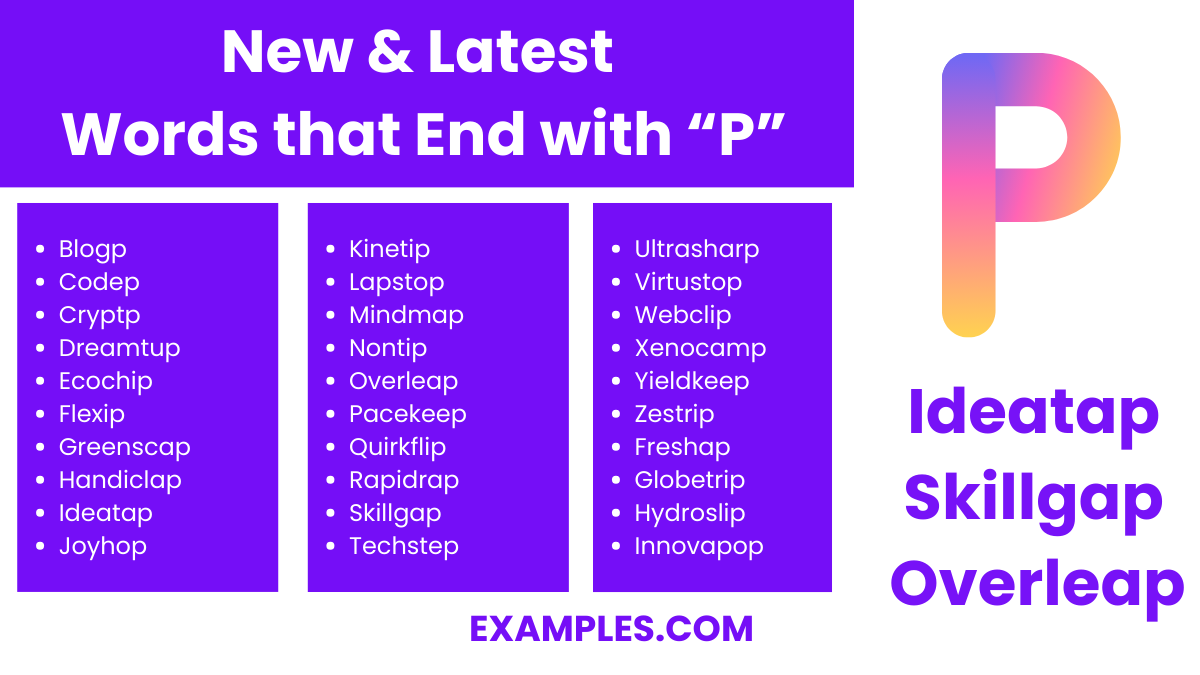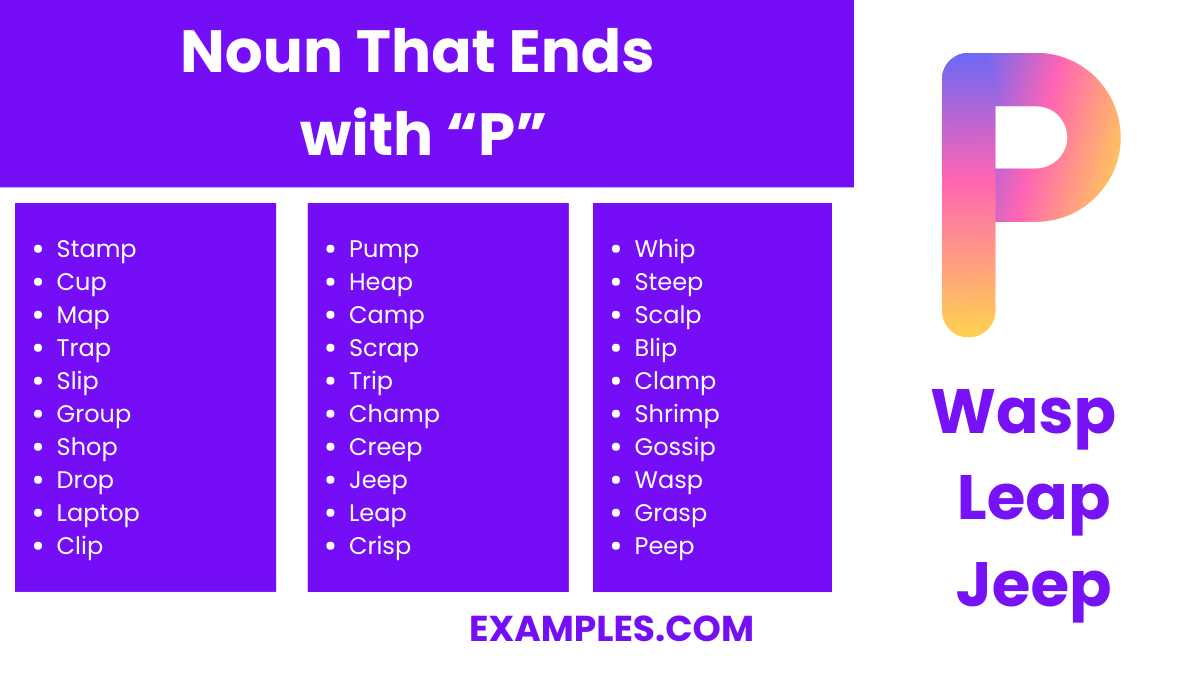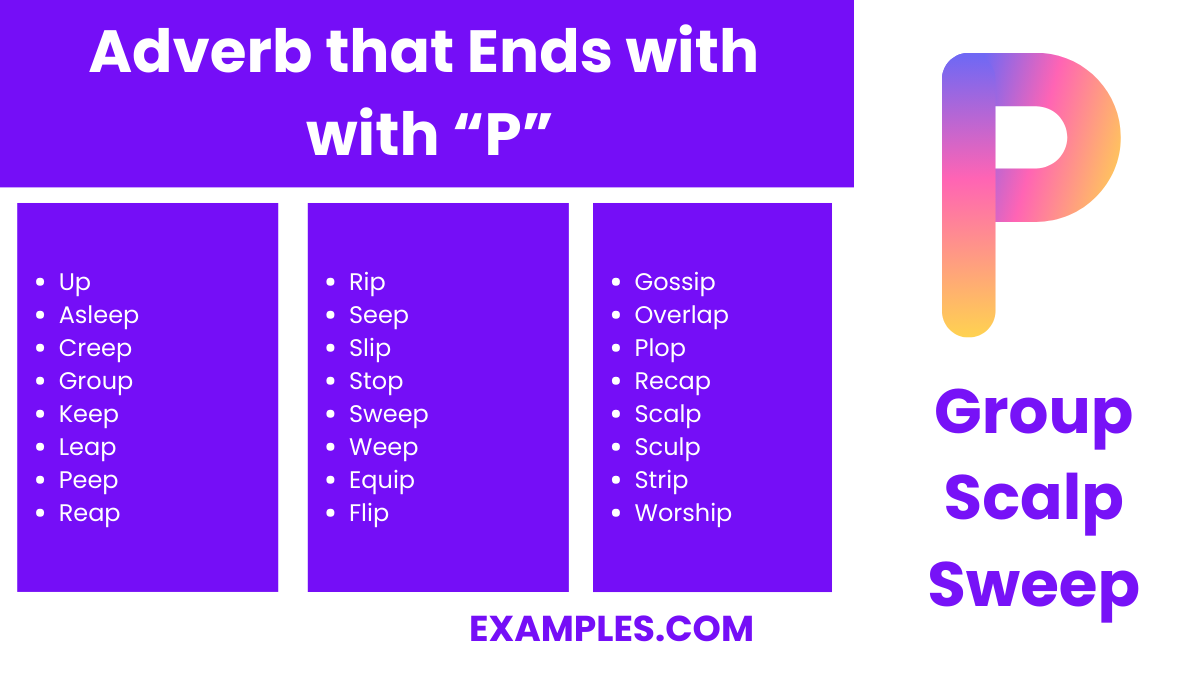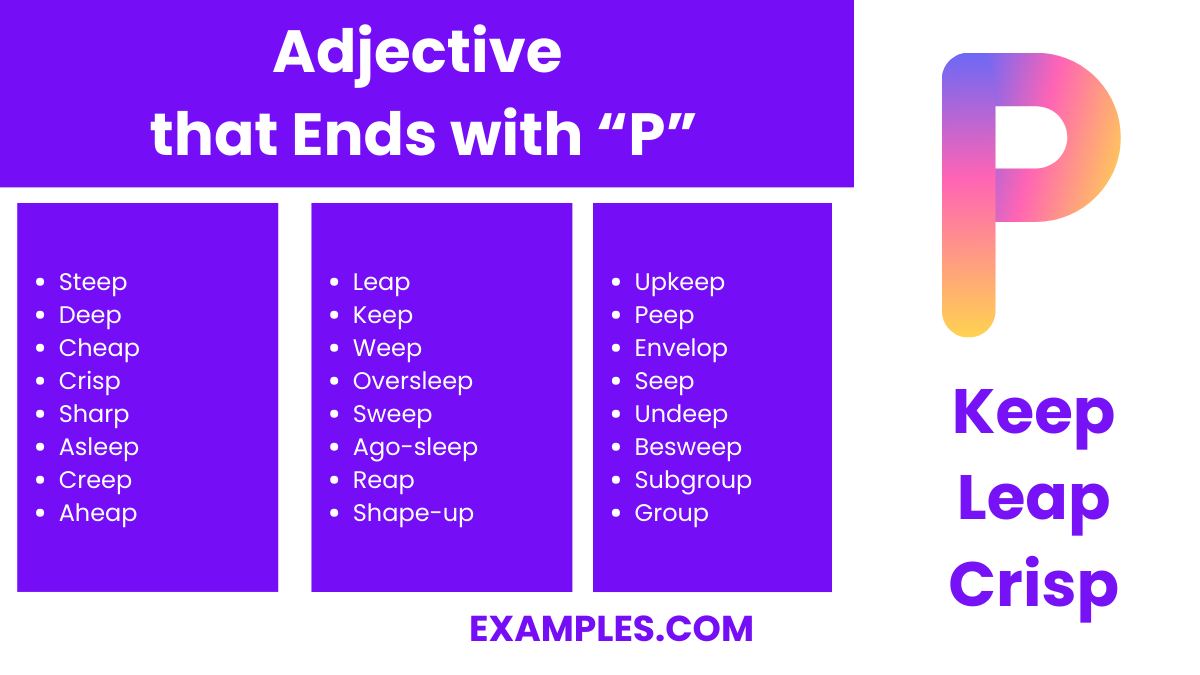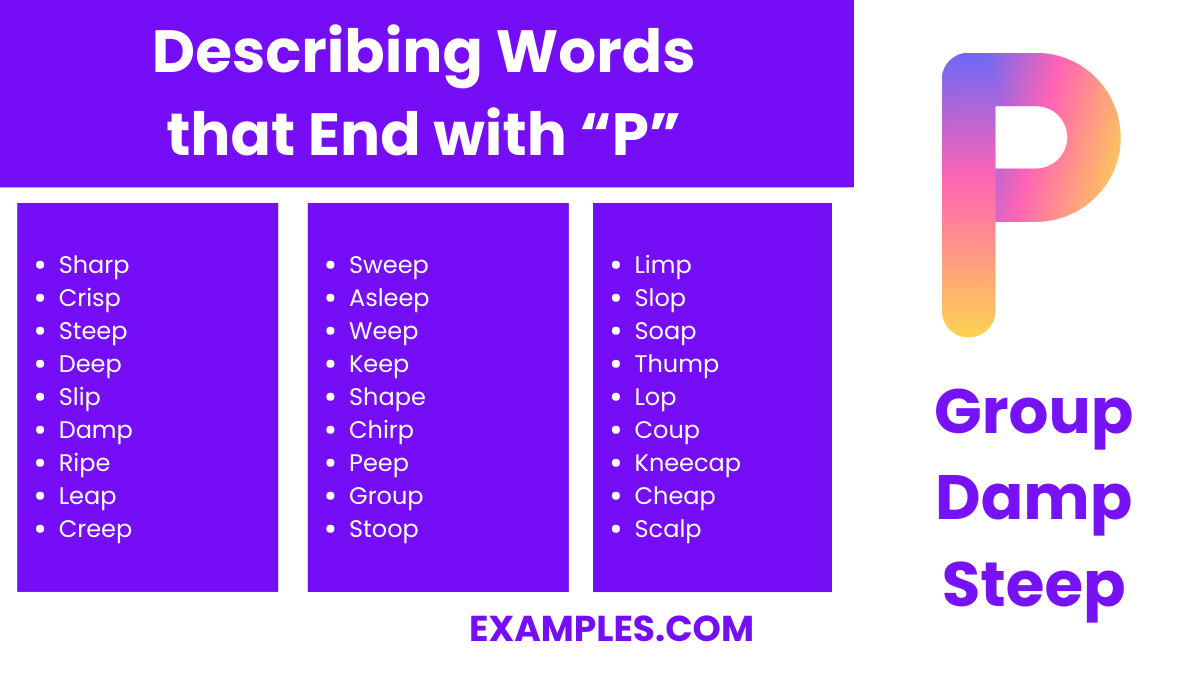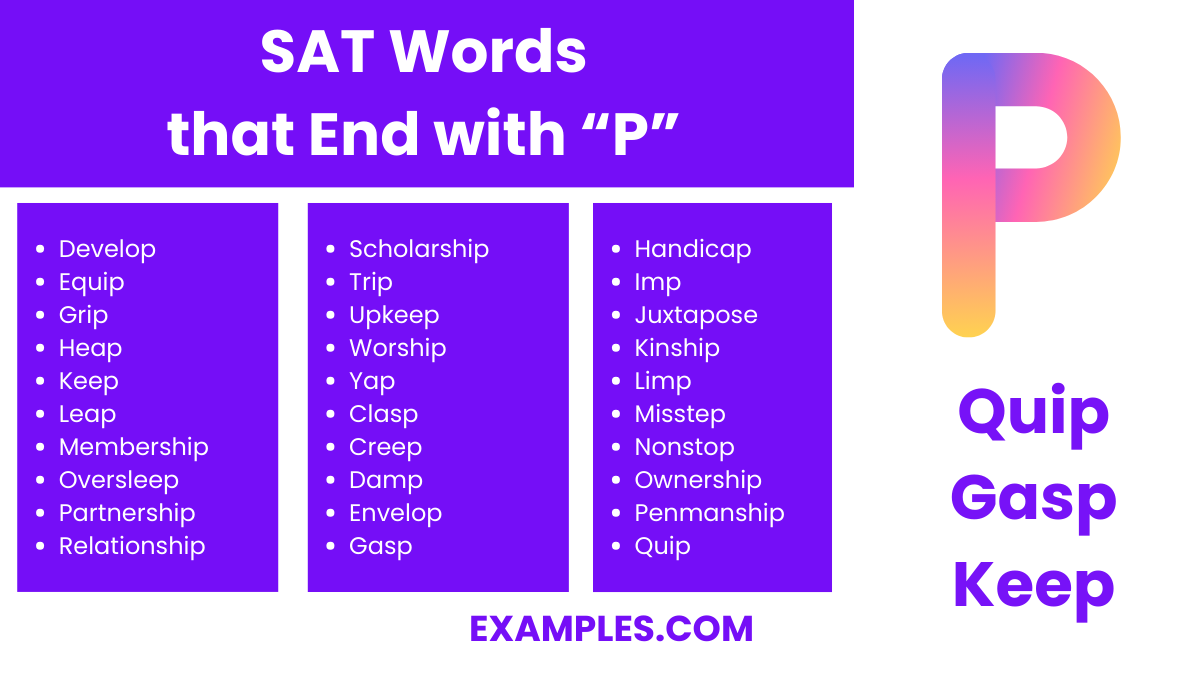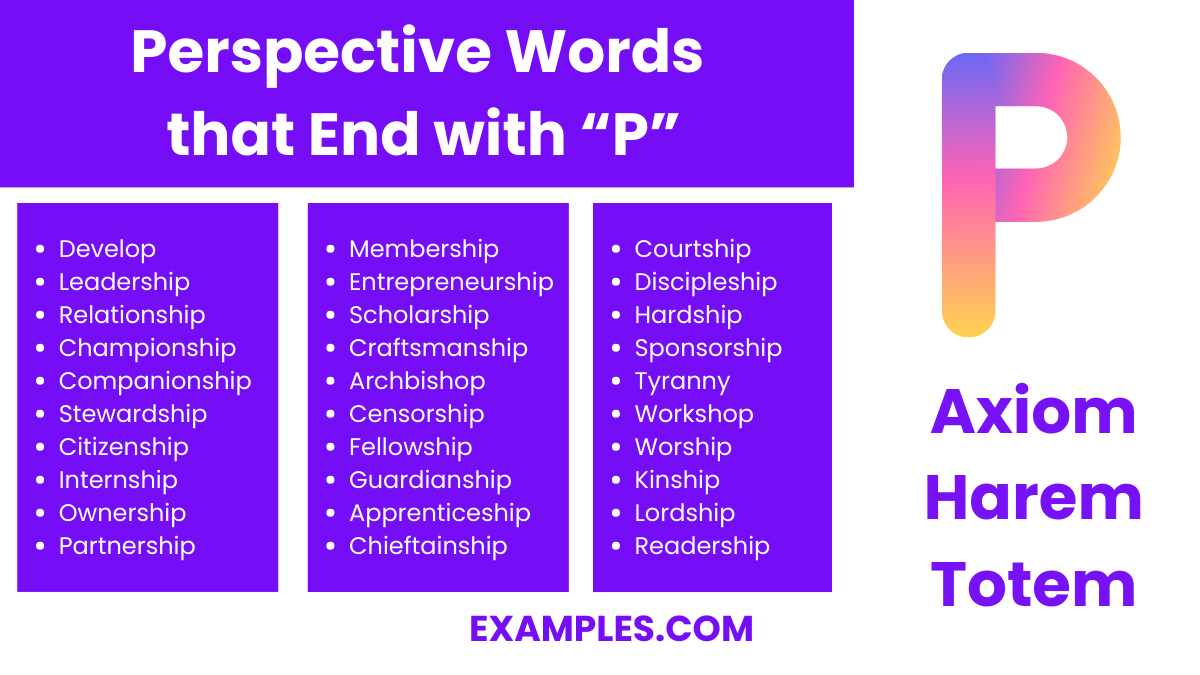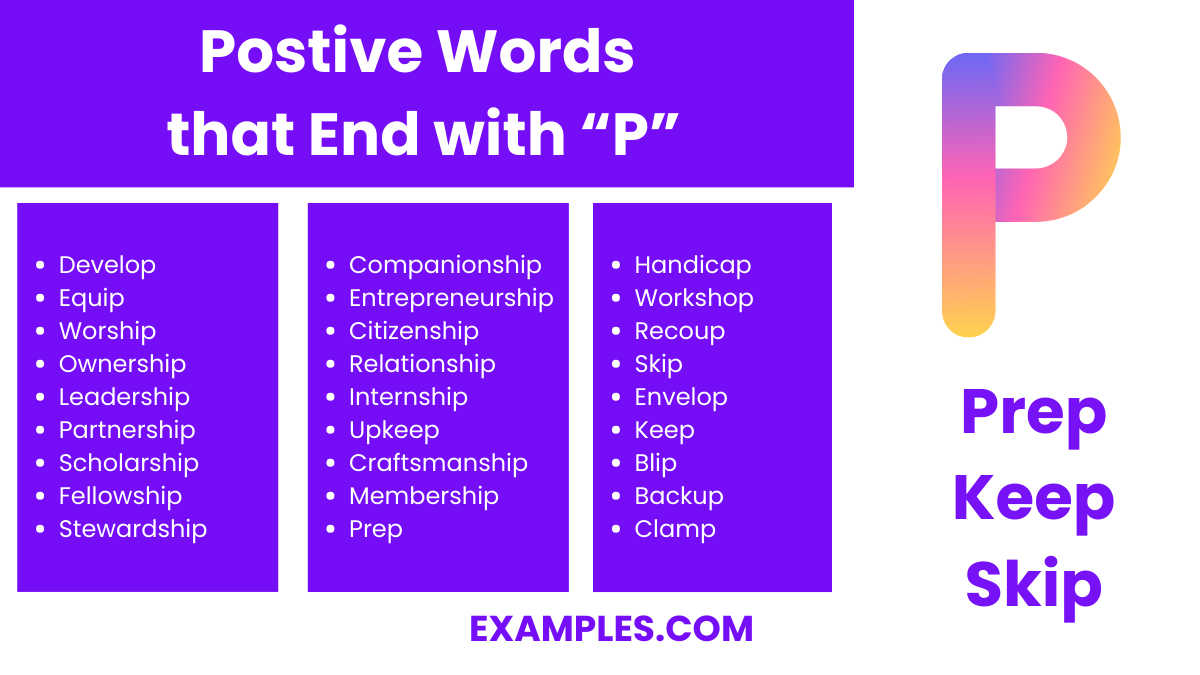150+ Words Ending With P List, Meaning, PDF
Words that end with ‘P’ unveils a rich tapestry of the English language, offering educators a unique tool for enhancing vocabulary lessons. These ‘P’ words ending, encompassing a wide array of meanings from the gentle ‘whisper’ to the rhythmic ‘clap’, provide a dynamic approach to language learning. By delving into this diverse collection, teachers can spark curiosity and foster a deeper appreciation for linguistic nuances among students. Incorporating these words into various educational activities, such as creative writing, spelling bees, and interactive discussions, not only enriches students’ vocabulary but also enhances their engagement and understanding of language mechanics. This exploration into ‘P’-ending words thus becomes an invaluable asset in the realm of education, enriching the learning experience with its breadth and versatility.
Download Most Commonly Used Word Ending with P - PDF
150 Most Commonly Used Words Ending with “P”
In English, words ending with “P” encompass a broad spectrum, ranging from everyday langage to more specialized terms. These words often denote actions or states, making them crucial in imparting clear and precise meanings. Understanding and utilizing these words can significantly enhance vocabulary, especially for teachers aiming to expand their students’ language skills. Incorporating these words into teaching methods not only broadens linguistic understanding but also aids in developing cognitive and communication skills and abilities. Recognizing the importance of such words, we have compiled a list of 150 commonly used words ending in “P” for educators. This list serves as a valuable resource for lesson planning, vocabulary exercises, and interactive learning activities.
| Jump | Help | Develop | Keep | Sleep | Creep |
| Stop | Clap | Trip | Slip | Shop | Drop |
| Group | Wrap | Flip | Startup | Skip | Swap |
| Step | Pop | Crop | Snap | Slop | Flop |
| Slap | Top | Drip | Chip | Leap | Plop |
| Bump | Pump | Kneel | Tap | Scrap | Clump |
| Grip | Blip | Whip | Cup | Sip | Stoop |
| Steep | Mop | Slurp | Loop | Chap | Prop |
| Peep | Gallop | Equip | Weep | Hiccup | Scalp |
| Scamp | Tramp | Shrimp | Stomp | Cusp | Knop |
| Rasp | Gasp | Crisp | Limp | Scoop | Lop |
| Tarp | Warp | Burp | Hump | Sup | Whop |
| Yap | Sap | Schlep | Glop | Dap | Clop |
| Tep | Gimp | Harp | Quip | Chirp | Bleep |
| Yelp | Pomp | Sharp | Croup | Pimp | Clasp |
Most Trending Words that End with “P”
In the ever-changing world of the English language, certain words capture the zeitgeist, becoming emblematic of cultural shifts, technological innovations, and societal trends. For educators, staying abreast of these linguistic evolutions is essential to forge stronger connections with students and to enrich their lexicon. This curated list highlights the most trending words ending in ‘P,’ reflecting the vibrant tapestry of modern language and its inventive usage. These terms not only expand vocabulary but also invigorate students’ engagement with language, transforming learning into an immersive and dynamic experience. Accompanied by definitions, each word is selected for its relevance and ability to spark interest. By integrating these Rhyming Words, Daily Use English Words, and singular & plural words into your curriculum, you ensure that your language instruction remains contemporary, engaging, and comprehensive, resonating with students and enhancing their communicative proficiency.
- Startup: A newly established business, especially in technology.
- App: Short for application, commonly referring to software for mobile devices.
- Photoshop: To digitally alter images or photographs, often used generically.
- Recap: A summary or review of main points.
- Flip: To turn over or cause to turn over.
- Clap: To make a sharp, percussive sound by striking the hands together.
- Snap: To break suddenly with a sharp sound or to take a quick photograph.
- Drop: To let fall or to decrease suddenly.
- Crisp: Firm and fresh; not soft or wilted.
- Leadership: The action of leading a group or organization.
- Membership: The state of being a member of a group or organization.
- Relationship: The way in which two or more people or things are connected.
- Scholarship: Academic study or achievement; learning at a high level.
- Worship: The feeling or expression of reverence and adoration.
- Ownership: The act, state, or right of possessing something.
- Friendship: The emotions or conduct of friends; the state of being friends.
- Internship: A temporary position offering on-the-job training.
- Stewardship: The job of supervising or taking care of something.
- Craftsmanship: Skill in a particular craft.
- Partnership: The state of being a partner or partners.
- Loop: A shape produced by a curve that bends around and crosses itself.
- Troop: A group of soldiers, scouts, or performers.
- Gossip: Casual or unconstrained conversation or reports about other people.
- Desktop: The working surface of a desk or a computer’s primary user interface.
- Laptop: A portable computer.
- Workshop: A room or building in which goods are manufactured or repaired.
- Coup: A sudden, violent, and illegal seizure of power from a government.
- Slip: To slide unintentionally for a short distance.
- Prep: To prepare, especially in cooking or for an examination.
- Hip: Fashionably current; following the latest fashion in music, clothes, etc.
New & Latest Added Words that End with “P”
In the evolving tapestry of the English language, words that conclude with the letter ‘P’ offer a fascinating glimpse into linguistic growth. This compilation, particularly tailored for educators, zeroes in on the latest words finishing with ‘P’, showcasing the vibrancy of modern English. These terms, ranging from tech-related jargon to newly coined expressions, enrich classroom vocabulary and bridge the gap between traditional language study and contemporary communication. Delving into these words not only expands the lexical range but also aligns educators and students with the language’s current trajectory. Presented here are 30 fresh ‘P’-ending words, each elucidated with its meaning, ready to be woven into educational narratives. Including festive Christmas Words to seasonally spice up lessons and exploring Compound Words to delve into word formation enhances the learning experience, making it both comprehensive and engaging.
- Blogp – A digital platform for blogging and sharing ideas.
- Codep – An abbreviation for ‘codependent’.
- Cryptp – Related to cryptography or cryptic communications.
- Dreamtup – Imagined or conceived in one’s thoughts.
- Ecochip – A microchip designed for environmental sustainability.
- Flexip – An item or method exhibiting flexibility.
- Greenscap – Landscaping with an emphasis on eco-friendly practices.
- Handiclap – A clap performed with one hand.
- Ideatap – Tapping into a flow of ideas or creativity.
- Joyhop – A light, joyful jump or skip.
- Kinetip – Related to kinetic energy or movement.
- Lapstop – A device or situation that stops something from reaching one’s lap.
- Mindmap – A diagram used to visually organize information.
- Nontip – A situation where tipping is not customary.
- Overleap – To leap over or surpass.
- Pacekeep – Maintaining a consistent speed or rhythm.
- Quirkflip – A sudden or unusual change or flip in behavior.
- Rapidrap – A fast-paced conversation or rap.
- Skillgap – The difference between required and existing skills.
- Techstep – A step forward in technological advancements.
- Ultrasharp – Extremely sharp or defined.
- Virtustop – A point where virtual activities cease.
- Webclip – A short clip or segment from the internet.
- Xenocamp – A camp focusing on foreign or alien concepts.
- Yieldkeep – Maintaining a consistent yield or output.
- Zestrip – A strip or peel of citrus zest.
- Freshap – Fresh appearance or outlook.
- Globetrip – A trip around the globe or worldwide travel.
- Hydroslip – A slip or slide on a water surface.
- Innovapop – A burst of innovative ideas or products.
Noun That Ends with “P”
The exploration of the English language uncovers a wealth of nouns concluding with “p,” each contributing to the richness of our vocabulary and the effectiveness of our communication. Educators often emphasize these specific endings to challenge and expand students’ linguistic abilities. This curated selection of nouns ending in “p” serves as an invaluable resource for crafting engaging lessons focused on spelling, pronunciation, and vocabulary expansion. Accompanied by definitions, this collection aids educators in their mission to broaden students’ understanding and mastery of English. Incorporating Consonant Words strengthens phonetic awareness, while integrating Dictation Words enhances spelling accuracy, making this list a comprehensive tool for educational enrichment.
- Stamp – A small piece of paper with an adhesive side, used for postage or as a mark of approval.
- Cup – A small bowl-shaped container for drinking, typically with a handle.
- Map – A diagrammatic representation of an area of land or sea showing physical features.
- Trap – A device or enclosure designed to catch and retain animals or objects.
- Slip – A small piece of paper, typically used for writing a brief note.
- Group – A number of people or things that are located, gathered, or classed together.
- Shop – A building or part of a building where goods or services are sold.
- Drop – A small round or pear-shaped portion of liquid that hangs or falls or adheres to a surface.
- Laptop – A portable computer that can be used in a variety of settings.
- Clip – A device typically used for holding things together or attaching them to something.
- Pump – A mechanical device using suction or pressure to raise or move liquids, compress gases, or force air into inflatable objects.
- Heap – A large, disordered pile of things.
- Camp – A place with temporary accommodations of huts, tents, or other structures.
- Scrap – A small piece or amount of something, especially one that is left over after the greater part has been used.
- Trip – A journey or excursion, especially for pleasure.
- Champ – A champion, especially in sports.
- Creep – A detested or objectionable person.
- Jeep – A small, rugged motor vehicle typically used for off-road driving.
- Leap – A forceful jump or quick movement.
- Crisp – A thin slice of potato fried or baked until crisp and eaten as a snack.
- Whip – A strip of leather or length of cord fastened to a handle, used for flogging or beating a person or for urging on an animal.
- Steep – A high or abrupt slope or incline.
- Scalp – The skin covering the head, excluding the face.
- Blip – A sudden, minor, and typically temporary deviation from a general trend.
- Clamp – A brace, band, or clasp used for strengthening or holding things together.
- Shrimp – A small, slender, marine crustacean with an elongated body and a primarily swimming mode of life.
- Gossip – Casual or unconstrained conversation or reports about other people, typically involving details not confirmed as true.
- Wasp – A social winged insect which has a narrow waist and a sting and is typically yellow with black stripes.
- Grasp – A firm hold or grip.
- Peep – A quick or furtive look.
Adverb That Ends with “P”
Adverbs play a pivotal role in English grammar, enhancing sentences with depth and detail. They modify verbs, adjectives, or other adverbs words, providing insights into how, when, where, or the extent to which actions occur. Among these, adverbs ending in “-p” offer unique modifications, though they might not always be in the spotlight. For educators striving to deepen students’ vocabulary and grammatical prowess, focusing on these adverbs is beneficial. This collection of 30 adverbs ending in “-p,” each accompanied by its definition, serves as a valuable resource for teachers to diversify their instructional materials. Incorporating Encouraging Words and Funny Words into lessons can further engage students, making the learning process both effective and enjoyable.
- Up – Toward a higher place or position.
- Asleep – In the state of sleeping.
- Creep – To move slowly and quietly.
- Group – To gather or be gathered into a group.
- Keep – To continue or persist in doing something.
- Leap – To jump or spring a long way.
- Peep – To look quickly and typically furtively.
- Reap – To obtain as a result of effort.
- Rip – To tear or be torn quickly and violently.
- Seep – To flow or pass slowly through small openings.
- Slip – To slide unintentionally for a short distance.
- Stop – To come to an end; cease to happen.
- Sweep – To clean or clear (a space) with a broom or brush.
- Weep – To cry or shed tears.
- Equip – To provide with necessary materials or tools.
- Flip – To turn over quickly.
- Gossip – To talk casually about other people.
- Overlap – To extend over and cover a part of.
- Plop – To make a sound like something dropping into water.
- Recap – To summarize or review.
- Scalp – To sell tickets at a high price.
- Sculp – To create or shape by sculpting.
- Strip – To remove clothing or covering.
- Worship – To show reverence and adoration for a deity.
Adjectives That Ends with “P”
Adjectives ending with “p” are not commonly used, but they hold specific and unique meanings that can enrich vocabulary and enhance understanding in English. Teachers seeking to expand the linguistic abilities of their students or fellow educators will find these adjectives particularly useful. Such adjective words are vital in creating vivid descriptions and can play a significant role in various subjects, including creative writing and vocabulary development. Emphasizing these less common adjectives can intrigue students and encourage them to explore the depths of the English language.
- Steep – Having a sharp inclination; almost vertical.
- Deep – Extending far down from the top or surface.
- Cheap – Low in price; not expensive.
- Crisp – Firm, dry, and brittle, especially in a way considered pleasing.
- Sharp – Having an edge or point that is able to cut or pierce something.
- Asleep – In a state of sleep; sleeping.
- Creep – Move slowly and carefully to avoid being heard or noticed.
- Aheap – In a disordered pile.
- Leap – Jump or spring a long way, to a great height, or with great force.
- Keep – Have or retain possession of.
- Weep – Shed tears.
- Oversleep – Sleep longer than intended.
- Sweep – Clean or clear (a space, area, etc.) by brushing away dirt or litter.
- Ago-sleep – Falling into a state of sleep.
- Reap – Cut or gather (a crop or harvest).
- Shape-up – Improve in behavior or condition.
- Upkeep – The process of keeping something in good condition.
- Peep – Look quickly and furtively at something, especially through a narrow opening.
- Thorough-creep – To penetrate completely and fully.
- Envelop – Wrap up, cover, or surround completely.
- Seep – (of a liquid) flow or leak slowly through porous material or small holes.
- Undeep – Not deep; shallow.
- Besweep – To sweep thoroughly or completely.
- Subgroup – A secondary or subordinate group.
- Group – A number of people or things that are located, gathered, or classed together.
Describing Words That End with “P”
Describing words, also known as adjectives, play a crucial role in language by adding detail and depth to our sentences. A unique set of these words are those that end in “P”. These words are not only interesting but also enhance the vocabulary of teachers, students, and anyone keen on enriching their language skills. In English, words ending in “P” are less common, making them distinctive and valuable for educational purposes. Teachers can use these words to introduce new vocabulary to students, especially in creative writing and descriptive language exercises. Understanding and utilizing such words can significantly improve language fluency and expression. Below is a list of 30 describing words ending in “P” with their meanings. Each word is presented in bold for easy identification and understanding.
- Sharp: Having a fine edge or point; keen.
- Crisp: Firm and fresh; not soft or wilted.
- Steep: Having a sharp inclination; almost vertical.
- Deep: Extending far down from the top or surface.
- Cheap: Low in price; not expensive.
- Slip: Smooth, slick, or sliding.
- Damp: Slightly wet; moist.
- Ripe: Fully developed; ready to eat.
- Leap: Characterized by jumping or springing.
- Creep: Moving slowly and carefully.
- Sweep: Wide-ranging or extensive.
- Asleep: Sleeping; not awake.
- Weep: Prone to crying or shedding tears.
- Keep: Tending to retain or hold.
- Shape: Defining form or contour.
- Chirp: Having a short, sharp, cheerful sound.
- Peep: Barely perceptible or visible.
- Group: Relating to a collection or assembly.
- Stoop: Bent forward; bowed.
- Limp: Lacking stiffness or firmness.
- Slop: Spilled or overflowing.
- Soap: Resembling or containing soap.
- Thump: Producing a heavy, dull sound.
- Lop: Hanging down or drooping.
- Coup: Remarkably successful.
- Kneecap: Pertaining to the patella.
- Scalp: Relating to the skin covering the head.
SAT Words That End with “P”
SAT words requires a broad vocabulary. For educators guiding students through SAT prep, emphasizing words with specific endings, like “P,” can be strategically beneficial. This article introduces a curated list of SAT-relevant words ending in “P,” offering a targeted approach to vocabulary enhancement. These words are instrumental not only for SAT success but also for fostering a richer vocabulary foundation. Mastery of these terms can empower students to navigate SAT reading passages more effectively and elevate their essay writing with nuanced language. Incorporating Praising Words can motivate students, while focusing on Vowel Words enriches phonetic understanding, making this list a comprehensive tool for SAT preparation and beyond.
1. Develop: To grow or cause to grow and become more mature or advanced.
2. Equip: To provide with the necessary items for a particular purpose.
3. Grip: To grasp, hold, or control firmly.
4. Heap: An untidy collection of things piled up haphazardly.
5. Keep: To have or retain possession of something.
6. Leap: To jump or spring a long way, to a great height, or with great force.
7. Membership: The state of being a member of a group or organization.
8. Oversleep: To sleep longer than intended.
9. Partnership: An association of two or more people as partners.
10. Relationship: The way in which two or more people or things are connected.
11. Scholarship: Academic study or achievement; learning at a high level.
12. Trip: A journey or excursion, especially for pleasure.
13. Upkeep: The process of keeping something in good condition.
14. Worship: The feeling or expression of reverence and adoration for a deity.
15. Yap: To bark sharply, shrilly, or snappishly; a sharp, shrill bark.
16. Clasp: To grasp something tightly with one’s hand.
17. Creep: To move slowly and carefully in order to avoid being heard or noticed.
18. Damp: Slightly wet; moist.
19. Envelop: To wrap up, cover, or surround completely.
20. Gasp: To catch one’s breath with an open mouth due to surprise or exertion.
21. Handicap: A circumstance that makes progress or success difficult.
22. Imp: A small, mischievous devil or sprite.
23. Juxtapose: To place or deal with close together for contrasting effect.
24. Kinship: Blood relationship; a sharing of characteristics or origins.
25. Limp: To walk with difficulty, typically because of a damaged or stiff leg or foot.
26. Misstep: A mistaken step or movement.
27. Nonstop: Without stopping; continuous.
28. Ownership: The act, state, or right of possessing something.
29. Penmanship: The art or skill of writing by hand.
30. Quip: A witty remark.
Perspective Words that End with “P”
Perspective words ending in “P” offer a fascinating layer to language, enriching communication with diverse descriptors. For educators seeking to broaden their and their students’ linguistic range, these words are invaluable. They not only augment vocabulary but also engage learners creatively, fostering a dynamic classroom atmosphere. Mastering these terms enhances dialogue, particularly in educational contexts, where precise expression is paramount. This compilation of 30 perspective-enriching words ending in “P,” each with its definition, is tailored for pedagogical use. Chosen for their relevance and accessibility, these words serve as an excellent resource for enhancing instructional strategies. Integrating Sight Words enhances basic recognition skills, while Ness Words delve into the qualities and conditions associated with these terms, offering a comprehensive approach to vocabulary development.
- Develop – To grow or cause to grow and become more mature or advanced.
- Leadership – The action of leading a group of people or an organization.
- Relationship – The way in which two or more people or things are connected.
- Championship – A contest for the position of champion in a sport or game.
- Companionship – A feeling of fellowship or friendship.
- Stewardship – The job of supervising or taking care of something.
- Citizenship – The status of being a citizen of a particular country.
- Internship – A period of work experience offered by an organization.
- Ownership – The act, state, or right of possessing something.
- Partnership – An association of two or more people as partners.
- Membership – The state of being a member of a group or organization.
- Entrepreneurship – The activity of setting up a business.
- Scholarship – Academic study or achievement; learning at a high level.
- Craftsmanship – Skill in a particular craft.
- Archbishop – A senior bishop in charge of an archdiocese.
- Censorship – The suppression of speech or other public communication.
- Fellowship – Friendly association, especially with people who share one’s interests.
- Guardianship – The position of being a guardian or protector.
- Apprenticeship – The position of an apprentice.
- Chieftainship – The position or period of rule of a chieftain.
- Courtship – A period during which a couple develop a romantic relationship.
- Discipleship – The state of being a disciple or follower.
- Hardship – Severe suffering or privation.
- Sponsorship – The position of being a sponsor.
- Tyranny – Cruel and oppressive government or rule.
- Workshop – A room or building in which goods are manufactured or repaired.
- Worship – The feeling or expression of reverence and adoration.
- Kinship – Blood relationship.
- Lordship – The authority of a lord.
- Readership – The readers of a newspaper, magazine, or book considered collectively.
Short Words that End with “P”
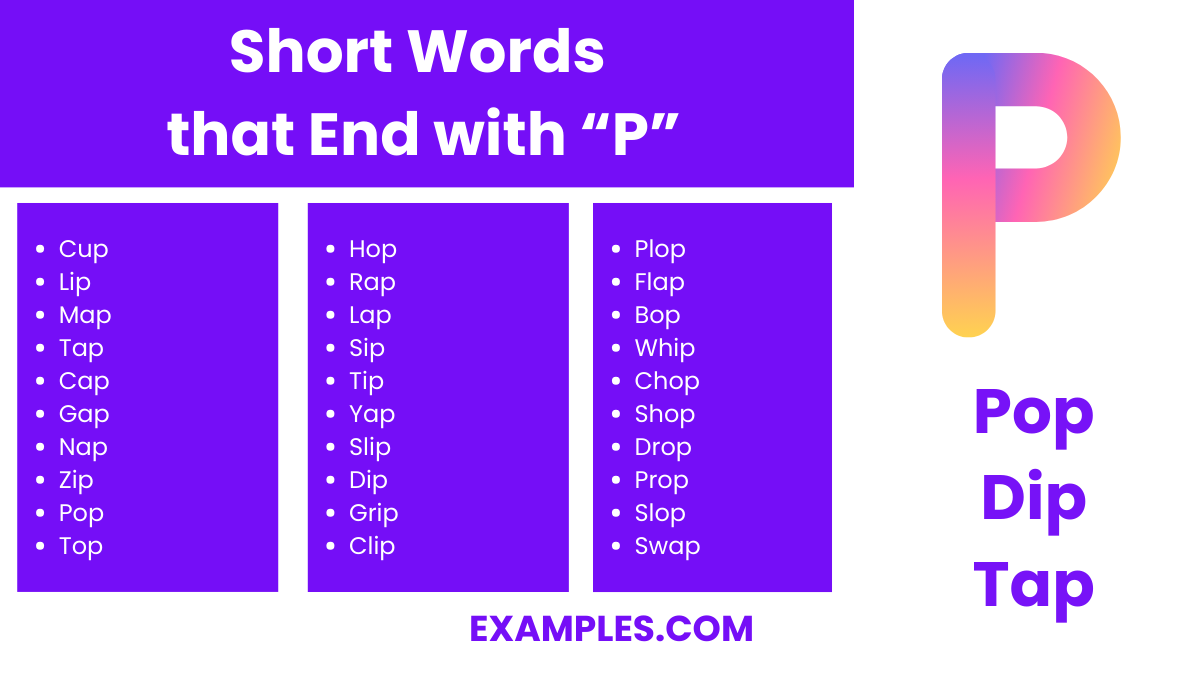
Exploring short words ending in ‘P’ can be incredibly beneficial for educators and students alike. These words, often simple yet versatile, are fundamental in teaching phonics, word formation, and spelling. They are particularly useful for early language learners, enabling a grasp of basic word structures. This list serves as a resource for teachers and tutors to enhance vocabulary lessons, spelling exercises, and creative writing tasks. By incorporating these words into teaching strategies, educators can effectively support language development in a fun and engaging way.
- Cup – A small container used for drinking
- Lip – The edge of the mouth
- Map – A representation of an area’s geography
- Tap – To touch lightly or to draw liquid
- Cap – A type of hat or a cover for a container
- Gap – A space or opening between things
- Nap – A short sleep
- Zip – A fastening device or to move quickly
- Pop – A sharp explosive sound or type of music
- Top – The highest part or a garment for the upper body
- Hop – To jump on one foot
- Rap – To knock or a genre of music
- Lap – The upper part of the legs when sitting
- Sip – To drink in small mouthfuls
- Tip – The end part of something or advice
- Yap – To bark sharply or talk loudly
- Slip – To slide unintentionally or a small mistake
- Dip – To put into a liquid or decrease
- Grip – To hold tightly
- Clip – To cut short or a fastener
- Plop – A sound of something dropping into liquid
- Flap – To move up and down or a thin, flat piece
- Bop – A type of dance or hit lightly
- Whip – To beat quickly or a device for beating
- Chop – To cut into pieces
- Shop – A place to buy things
- Drop – To fall or let fall
- Prop – To support or a supporting object
- Slop – Spilled or messy food
- Swap – To exchange
Positive Words that Ends with “P”
Exploring positive words that end with the letter ‘P’ can be a fascinating exercise for educators and students alike. These words not only enhance vocabulary but also contribute to a more optimistic outlook. They are especially valuable in educational settings, where positive language can significantly impact teaching methodologies and student morale. For teachers looking to inspire and educate, incorporating these words into lessons or conversations can be incredibly beneficial. This list not only presents the words but also offers their meanings, making it easier for educators to integrate them into their teaching materials.
- Develop – To grow or cause to grow and become more mature, advanced, or elaborate.
- Equip – To supply with the necessary items for a particular purpose.
- Worship – The feeling or expression of reverence and adoration.
- Ownership – The act, state, or right of possessing something.
- Leadership – The action of leading a group of people or an organization.
- Partnership – An arrangement where parties agree to cooperate to advance their mutual interests.
- Scholarship – Academic study or achievement; learning at a high level.
- Fellowship – Friendly association, especially with people who share one’s interests.
- Stewardship – The job of supervising or taking care of something, such as an organization or property.
- Companionship – A feeling of fellowship or friendship.
- Entrepreneurship – The process of designing, launching, and running a new business.
- Citizenship – The position or status of being a citizen of a particular country.
- Relationship – The way in which two or more people or things are connected, or the state of being connected.
- Internship – A period of work experience offered by an organization for a limited period of time.
- Upkeep – The process of keeping something in good condition.
- Craftsmanship – The quality of design and work shown in something made by hand; artistry.
- Membership – The state of being a member of a group or organization.
- Prep – Short for preparation, or prepare.
- Handicap – A condition that markedly restricts a person’s ability to function physically, mentally, or socially.
- Workshop – A meeting at which a group of people engage in intensive discussion and activity on a particular subject or project.
- Recoup – To regain something lost or expended.
- Skip – To move lightly and quickly, making a small jump after each step.
- Envelop – To wrap up, cover, or surround completely.
- Keep – To have or retain possession of.
- Blip – A sudden, minor, and typically temporary deviation from a general trend.
- Backup – Support or help.
- Clamp – To fasten things tightly together.
- Group – A number of people or things that are located, gathered, or classed together.
In conclusion, utilizing words ending with ‘P’ can significantly enrich language and communication. Teachers and students alike benefit from exploring these words, which not only boost vocabulary but also instill positivity. Incorporating such words in daily conversations and educational materials is an effective way to enhance language skills. Remember, the key is to understand their meanings and use them contextually to make communication more impactful and engaging.


